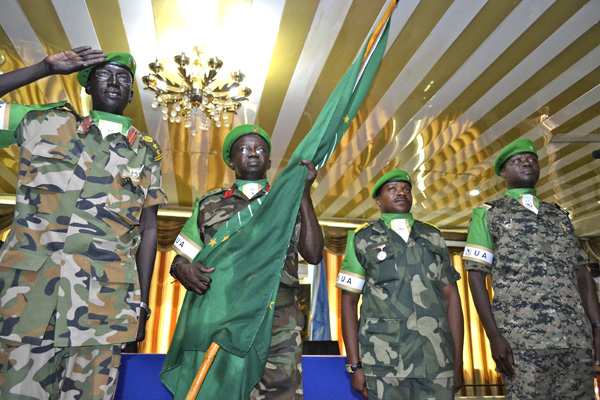
JUBA, South Sudan — At a ceremony held in Juba several days ago, the African Union officially launched the implementation of its initiative against the Lord’s Resistance Army, or LRA, including an A.U. military task force. However, several key details about the military task force remain unclear, raising concerns that it will essentially put a new name on current efforts by the regional governments that have been largely failing.
The goal of the A.U. Regional Cooperation Initiative is to realize the “elimination of the LRA, leading to the creation of a secure and stable environment” in the four countries affected by the LRA: Uganda, the Democratic Republic of Congo, the Central African Republic, and South Sudan. After the A.U. Peace and Security Council authorized the initiative last November, A.U. Commission Chairperson Jean Ping appointed a special envoy on the LRA, Francisco Caetano José Madeira. Under an A.U.-authorized mission, the governments of the affected countries have agreed to contribute 5,000 troops to form a Regional Task Force, or RTF. Formally “inaugurated” a week ago, the RTF headquarters is located in Yambio, South Sudan near the South Sudan-Congo border. RTF units will be also based in Dungu, Congo and Obo, Central African Republic, or CAR, officials said.
The ceremony was attended by the United Nations special representative of the secretary-general for Central Africa, Abou Moussa, the South Sudan Vice President Riek Machar, representatives from the four affected countries, as well as representatives from international partners, including the United States and the European Union.
Those present agreed that it is time to end the LRA.
“We’re on a mission,” said A.U. special envoy Madeira. “We need to stop Kony.” When asked how long the task force would operate, Madeira replied: “When we capture Kony or he hands himself in or we neutralize him in some way, that will be the end. That’s the timeframe.” U.N. special representative Moussa addressed the timeframe too. “My office will not relent its efforts in the struggle to end the LRA rebellion and bring its leaders to justice,” Moussa said.
Vice President Machar said this is the first time that South Sudan is actively participating in the military operations against the LRA. He reminded the audience of South Sudan’s efforts from 2006 through 2008 mediating between Kony and the government of Uganda: “Our position was different in the past, because we were under Khartoum.” The officials who spoke at the event expressed broad consensus that Kony must be brought to justice but also acknowledged that an array of strategies for ending the LRA must be pursued. “We are not murderers, we are stopping murderers to stop killing people,” Machar said.
Ambra Longatti, the European Union representative in South Sudan, reiterated the organization’s continued support for efforts to end the LRA crisis. The E.U. has provided financial assistance to the areas affected by the LRA along with funding to support the mandate and activities of the A.U. special envoy.
Christopher Datta, a representative from the U.S. embassy in Juba, stated, “Enough is enough.” Datta closed his remarks by sending a message to the leader of the LRA: “Kony, you will face justice. You can’t use borders as your advantage.”
But despite these strong expressions of commitment to tracking the LRA, a number of important questions remain about the details of the regional force and how it will enhance efforts currently underway. Unresolved issues include funding, the lack of capable troops and availability of additional forces, the commitment and capabilities of the national armies, and distrust and a lack of collaboration among the four governments.
For example, the 100 U.S. military advisors sent by President Obama to east and central Africa last year were deployed to build the capacity and strengthen intelligence and operational planning among the regional governments. However, substantial gaps still exist in transportation and intelligence capabilities that could severely hamper the effectiveness of the U.S. advisors mission and the A.U. initiative.
Further, an impasse between the Congolese and Ugandan governments has greatly limited the military campaign against the LRA in Congo. It has been six months since the Congolese government asked the Ugandan army to stop all operations there in pursuit of the LRA. After Kampala recently accused Kinshasa of obstructing its ability to fight the LRA there, Kinshasa stated that the LRA is no longer a threat in Congo. But LRA attacks in Congo are on the rise.
Ugandan Brigadier General Dick Olum will head the Regional Task Force and addressed some of these deficiencies. He told the Enough Project that even though inadequate equipment and resources may limit the new regional force, there is no shortage of motivation to go after Kony. He emphasized the need for regional cooperation and stressed that Kony may seek shelter in the countries where the Regional Task Force will not be able to operate, specifically citing Sudan.
The force is authorized, rather than mandated, by the A.U., and the national armies of the four countries will bear the cost of operations. However, it is unclear how those governments will come up with the funding for the mission. Officials at the ceremony acknowledged that finding money is a problem.
Uganda recently said it would allocate 1,500 of its troops currently pursuing the LRA in CAR for the new A.U. operation. But it is still unclear where the remaining 3,500 troops will come from for the mission to reach its 5,000 troops strength, when those forces will arrive, and whether all the troops will be under a single military command.
Photo: Ugandan Brigadier General Dick Olum and top commanders of the new Regional Task Force at the launch ceremony in Juba (Enough / Nenad Marinkovic)

